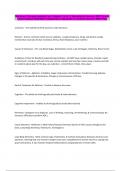Hartman's Nursing Assistant Care Chapter 5, 6, & 7 | Questions & Answers (100 %Score)
Latest Updated 2024/2025 Comprehensive Questions A+ Graded Answers | 100% Pass
Confusion - The inability to think clearly or make decisions
Delirium - Severe confusion which occurs suddenly - usually temporary- Drugs and alcohol usually
involved but could also be due to disease, illness, fluid imbalance, poor nutrition
Causes of Confusion - UTI, Low Blood Sugar, Dehydration, Fever, Lack of Oxygen, Infections, Brain Tumor
Guidelines of Care for Residents experiencing Confusion - Do NOT leave resident alone, provide a quiet
environment, introduce self each time you see the resident and use their name, Keep a routine and talk
to residents about plan for the day, use calendars - remind them of date, time, place
Signs of Delirium - Agitation, Irritability, Anger, Depression, Diorientation, Trouble focusing, Aphasia,
Changes in Perspective & Sensations, Changes in Consciousness, STM loss
Goal of Treatment for Delirium - Control or Reverse the cause
Cognition - The ability to think logically and clearly & make decisions
Cognitive Impairment - Inability to think logically & clearly (Not rational)
Dementia - Symptom not a diagnosis. Loss of thinking, reasoning, remembering, & communicating. No
recovery. Difficulty to perform ADL's.
Cause Dementia - Alzheimer's, Multi-Infarc/Vascular Dementia (series of CVAs causes damage to the
brain, Lewy Body Dementia, Parkinson's, Huntington's.
Lewy Body Dementia - Most common type of dementia. It involves fluctuations between alertness and
attention, meaning that one moment resident may seem completely fine and the next he is staring into
space and drowsy. It also involves frequent hallucinations and gradual loss of motor skills.
, Huntington's Disease - Caused by a faulty gene on chromosome 4. The faulty gene leads to a damage of
the nerve cells in areas of the brain, including the the basal ganglia and cerebral cortex.
This leads to gradual physical, mental and emotional changes. It is a dominant hereditary disease.
The hallmark symptom is uncontrolled movement of the arms, legs, head, face and upper body. Also
causes a decline in thinking and reasoning skills, including memory, concentration, judgment and ability
to plan and organize.
Other symptoms include alterations in mood, especially depression, anxiety, and uncharacteristic anger
and irritability, obsessive-compulsive behavior, leading a person to repeat the same question or activity
over and over.
Alzheimer's Disease - Most common cause of dementia in the "elderly". Women are more prone to the
disease (possibly hormone imbalances). Causes "tangled nerve fibers (tangles)" and protein deposits to
form in the brain. No known cause or cure. Only sure way to "diagnose is by autopsy".
Skills a person has used over a lifetime (playing instruments) are usually kept longer.
Alzheimer's Care Guidelines - Encourage independence to keep mind and body active as possible.
Problem solving, socializing , reading, working/projects all help slow the disease.
CNA's attitude when dealing with Alzheimer's should be: - Empathetic, DON"T take things personally,
"Let's..." Team Effort Approach
Strategies for better communication with Alzheimer's patients - Approach from front (so as not to
startle)
Determine patient's "space bubble" comfort zone
Reduce distractions
Always identify yourself and address resident by name
Lower tone of voice
Use same words and phrases & repeat yourself
Use signs, pictures & gestures




